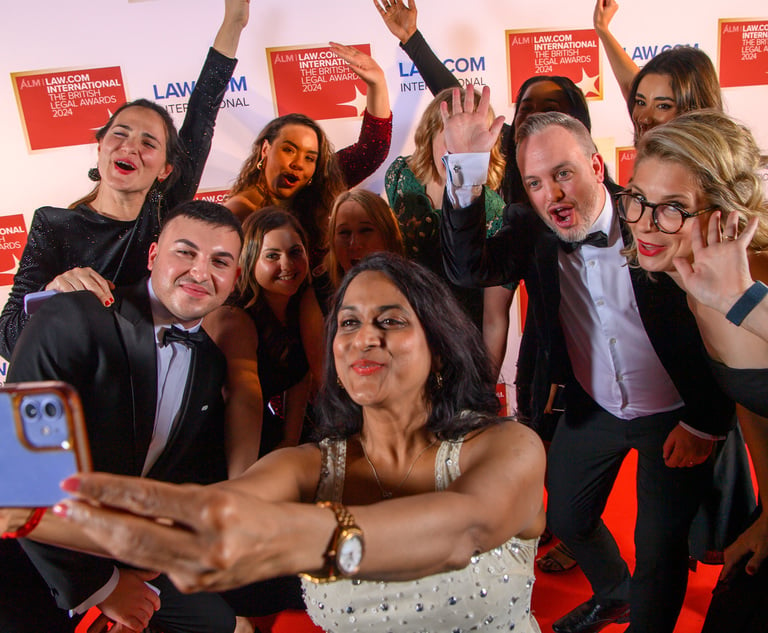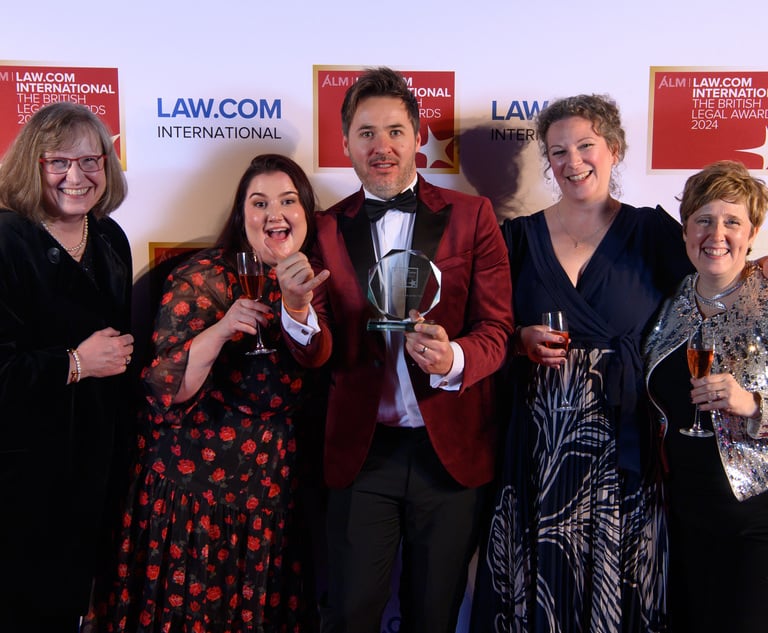National Grid's legal operations chief on pain points and problematic mindsets
Mo Zain Ajaz is global head of legal operational excellence at National Grid and founder of legal operations consultancy Lex360. At LegalWeek CONNECT,…
November 08, 2018 at 12:00 AM
6 minute read
Mo Zain Ajaz is global head of legal operational excellence at National Grid and founder of legal operations consultancy Lex360. At LegalWeek CONNECT, which is taking place in London later this month, he will be discussing how businesses can work with law firms to create a plan of action for better inter-team collaboration.
At LegalWeek CONNECT you're part of a panel discussion on legal departments and how they can drive better collaboration, both internally and externally – what are you expecting to touch on?
We've been given 10 minutes to do a TED-type talk about creating a roadmap for collaboration. I've set out a guide to create this roadmap. It starts with infrastructure, which is putting down what needs to be done and making sure everyone knows what they're doing. Then the next stage is aligning priorities – being clear as to what the priorities are for working with everyone. Then the last one's all around stats-based relationship management – looking at the stats and understanding how well it's working and how effective the plan is.
What does the term collaboration mean to you personally?
Putting the right people in a space where they can solve or work on something together, which then gives the project collective value.
In your workshop you're talking about how to create an 'action plan' for collaboration. What do you think is the best way for a company to approach this sort of plan to create a collaborative partnership?
We worked out what our pain points were, we worked with internal teams and spoke about what concerns there were for working with law firms, and then from that we would build our priorities, come up with ideas and then impose a plan. You can't write an action plan in isolation – it has to be thought out by considering what needs improving. So you need everyone to come up with their various concerns to then create a plan to solve these concerns.
And what were the pain points you discovered?
When we first did this, one of our pain points was that we had no sense of standards over how we managed our company. We wanted to be able to create some measurement system for our standards and values, so this was something we then addressed. And another one was how well we carried out legal training.
What pain points are you trying to overcome now?
As the organisation goes through different stages, we naturally have different priorities at different times. One thing we want to do is automate our contracts and we are collaborating with law firms to help us do that. We are speaking to our firms about our objectives, and collaborating with them to figure out how this programme will work.
Can new technology make collaboration easier? Are there any examples you can cite?
Technology is definitely an enabler, be it extranet platforms (HighQ), matter management platforms (Unity), automation and self-service platforms (Contract Express or Clarilis), or outside counsel feedback platforms (Top 3 Legal or Pursuit), allowing the legal function to co-create and deliver documents/projects with its business and internal and external legal teams.
At National Grid we believe that, where it makes commercial sense, if we own the technology stack it puts us in control and avoids us using multiple systems that each of our panel firms have. Clearly it makes little sense today for us to purchase e-discovery or AI platforms, so we use our panel firms' systems.
➤➤ Effective legal collaboration strategies and innovative partnerships will be explored on day one of LegalWeek CONNECT, taking place on 28-29 November at County Hall, London SE1. Click here for more information
How important is the culture of a businesses when it comes to encouraging collaboration? And can in-house lawyers play a role in driving this?
You can't expect collaboration to happen if you don't create the right conditions. If collaboration isn't given some evaluation or measurement, you're not going to get much effort put into it. At National Grid we do a lot of work with customers and stakeholders, and that drives our appetite for collaboration.
If there's no internal ownership of a programme, there's going to be superficial collaboration. So we, as a company, need to create the right environment for collaboration.
What is National Grid doing to encourage collaboration, both internally and with its external law firms?
We have collaboration excellence programmes where we have meetings to talk about how well we are collaborating. And we work on collaboration through our relationship management programme with law firms. So it happens on all different levels.
What are the the kind of roadblocks you've faced when trying to encourage better collaboration?
Cost is an issue, as is capacity. Also there's the issue of traditional versus progressive lawyers. The mindsets of different people can be problematic – that's a very important aspect.
Are you working on anything else at the moment?
In addition to my work at National Grid, I'm working on a collaboration portal for the legal ecosystem called LEx Open Source. Through this website, GCs and others in the ecosystem come together to address the biggest challenges that we face, using lean and design-thinking approaches. The website is free and contains numerous tools and discussions on these issues.
An example of a pain point I am working on with the ecosystem is co-creating a best practice/standard on contract lifecycle management – this will be an in-person session , happening in early 2019. We have had a tremendous response rate, with more than 50 organisations signing up from around the world. If you are interested, please register your details via: [email protected]
What about LegalWeek CONNECT are you looking forward to?
I think it's a really good source of networking and hearing examples of people doing something different to encourage collaboration.
This content has been archived. It is available through our partners, LexisNexis® and Bloomberg Law.
To view this content, please continue to their sites.
Not a Lexis Subscriber?
Subscribe Now
Not a Bloomberg Law Subscriber?
Subscribe Now
NOT FOR REPRINT
© 2024 ALM Global, LLC, All Rights Reserved. Request academic re-use from www.copyright.com. All other uses, submit a request to [email protected]. For more information visit Asset & Logo Licensing.
You Might Like
View All

The British Legal Awards 2024: Who Won What and Why—Transactional Awards

Kenya to Host Inaugural African Legal Technology & Innovation Awards in 2025

Trending Stories
- 1'Largest Retail Data Breach in History'? Hot Topic and Affiliated Brands Sued for Alleged Failure to Prevent Data Breach Linked to Snowflake Software
- 2Former President of New York State Bar, and the New York Bar Foundation, Dies As He Entered 70th Year as Attorney
- 3Legal Advocates in Uproar Upon Release of Footage Showing CO's Beat Black Inmate Before His Death
- 4Longtime Baker & Hostetler Partner, Former White House Counsel David Rivkin Dies at 68
- 5Court System Seeks Public Comment on E-Filing for Annual Report
Who Got The Work
Michael G. Bongiorno, Andrew Scott Dulberg and Elizabeth E. Driscoll from Wilmer Cutler Pickering Hale and Dorr have stepped in to represent Symbotic Inc., an A.I.-enabled technology platform that focuses on increasing supply chain efficiency, and other defendants in a pending shareholder derivative lawsuit. The case, filed Oct. 2 in Massachusetts District Court by the Brown Law Firm on behalf of Stephen Austen, accuses certain officers and directors of misleading investors in regard to Symbotic's potential for margin growth by failing to disclose that the company was not equipped to timely deploy its systems or manage expenses through project delays. The case, assigned to U.S. District Judge Nathaniel M. Gorton, is 1:24-cv-12522, Austen v. Cohen et al.
Who Got The Work
Edmund Polubinski and Marie Killmond of Davis Polk & Wardwell have entered appearances for data platform software development company MongoDB and other defendants in a pending shareholder derivative lawsuit. The action, filed Oct. 7 in New York Southern District Court by the Brown Law Firm, accuses the company's directors and/or officers of falsely expressing confidence in the company’s restructuring of its sales incentive plan and downplaying the severity of decreases in its upfront commitments. The case is 1:24-cv-07594, Roy v. Ittycheria et al.
Who Got The Work
Amy O. Bruchs and Kurt F. Ellison of Michael Best & Friedrich have entered appearances for Epic Systems Corp. in a pending employment discrimination lawsuit. The suit was filed Sept. 7 in Wisconsin Western District Court by Levine Eisberner LLC and Siri & Glimstad on behalf of a project manager who claims that he was wrongfully terminated after applying for a religious exemption to the defendant's COVID-19 vaccine mandate. The case, assigned to U.S. Magistrate Judge Anita Marie Boor, is 3:24-cv-00630, Secker, Nathan v. Epic Systems Corporation.
Who Got The Work
David X. Sullivan, Thomas J. Finn and Gregory A. Hall from McCarter & English have entered appearances for Sunrun Installation Services in a pending civil rights lawsuit. The complaint was filed Sept. 4 in Connecticut District Court by attorney Robert M. Berke on behalf of former employee George Edward Steins, who was arrested and charged with employing an unregistered home improvement salesperson. The complaint alleges that had Sunrun informed the Connecticut Department of Consumer Protection that the plaintiff's employment had ended in 2017 and that he no longer held Sunrun's home improvement contractor license, he would not have been hit with charges, which were dismissed in May 2024. The case, assigned to U.S. District Judge Jeffrey A. Meyer, is 3:24-cv-01423, Steins v. Sunrun, Inc. et al.
Who Got The Work
Greenberg Traurig shareholder Joshua L. Raskin has entered an appearance for boohoo.com UK Ltd. in a pending patent infringement lawsuit. The suit, filed Sept. 3 in Texas Eastern District Court by Rozier Hardt McDonough on behalf of Alto Dynamics, asserts five patents related to an online shopping platform. The case, assigned to U.S. District Judge Rodney Gilstrap, is 2:24-cv-00719, Alto Dynamics, LLC v. boohoo.com UK Limited.
Featured Firms
Law Offices of Gary Martin Hays & Associates, P.C.
(470) 294-1674
Law Offices of Mark E. Salomone
(857) 444-6468
Smith & Hassler
(713) 739-1250








